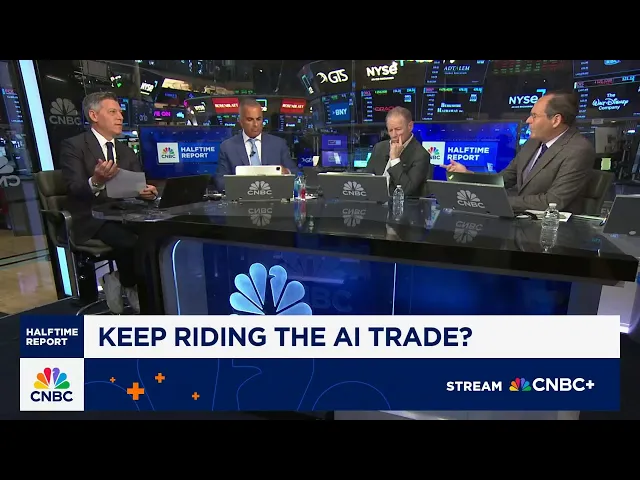Investing within the AI rally: Here’s what you need to know

Riding the AI wave without breaking
In a recent CNBC segment, host Scott Wapner assembled a panel of financial experts to examine the sustainability of the AI investment rally and how investors should approach it. The discussion addressed whether current valuations are justified, which companies will lead long-term, and strategic approaches to investing in this transformative technology. With billions flowing into AI development and adoption accelerating across industries, investors face critical decisions about timing and stock selection in what could be the most significant tech revolution of our era.
Key insights from the panel:
-
Valuation concerns are rising but most experts believe we're still early in the AI adoption cycle, with fundamental economic impacts just beginning to materialize despite already significant stock price appreciation
-
Stock selection is becoming increasingly critical as the market differentiates between true AI leaders with demonstrable earnings impact versus companies merely using AI as a marketing term
-
Hardware enablers like Nvidia continue to dominate the AI investment landscape, but software companies implementing AI solutions will likely drive the next wave of value creation
The most compelling insight from the discussion came from the acknowledgment that we're witnessing an unusual investment phenomenon: a technology revolution where the market has identified the winners early. Traditionally, technological transformations have been challenging for investors because revolutionary technologies often spawn numerous competitors, making it difficult to select long-term winners. But with AI, a handful of companies—particularly those controlling the essential infrastructure—have established formidable competitive moats through their data advantages, compute resources, and talent concentration.
This matters tremendously in the current market context because it suggests the typical pattern of disruptive innovation may not apply. Instead of an initial fragmented landscape that eventually consolidates, we're seeing early concentration of market power. For investors, this means the risk isn't necessarily overpaying for established AI leaders, but rather missing out on their continued dominance. The panel's discussion points to a nuanced view where valuation concerns are valid but must be balanced against the unprecedented economics of AI deployment and the barriers to entry that protect early movers.
What the panel didn't fully address is how regulatory scrutiny might reshape the competitive landscape. The concentration of AI capabilities among a handful of tech giants has already triggered antitrust concerns globally. The EU's AI Act, China's algorithmic regulations, and emerging US frameworks could significantly impact which companies
Recent Videos
How To Earn MONEY With Images (No Bullsh*t)
Smart earnings from your image collection In today's digital economy, passive income streams have become increasingly accessible to creators with various skill sets. A recent YouTube video cuts through the hype to explore legitimate ways photographers, designers, and even casual smartphone users can monetize their image collections. The strategies outlined don't rely on unrealistic promises or complicated schemes—instead, they focus on established marketplaces with proven revenue potential for image creators. Key Points Stock photography platforms like Shutterstock, Adobe Stock, and Getty Images remain viable income sources when you understand their specific requirements and optimize your submissions accordingly. Specialized marketplaces focusing...
Oct 3, 2025New SHAPE SHIFTING AI Robot Is Freaking People Out
Liquid robots will change everything In the quiet labs of Carnegie Mellon University, scientists have created something that feels plucked from science fiction—a magnetic slime robot that can transform between liquid and solid states, slipping through tight spaces before reassembling on the other side. This technology, showcased in a recent YouTube video, represents a significant leap beyond traditional robotics into a realm where machines mimic not just animal movements, but their fundamental physical properties. While the internet might be buzzing with dystopian concerns about "shape-shifting terminators," the reality offers far more promising applications that could revolutionize medicine, rescue operations, and...
Oct 3, 2025How To Do Homeless AI Tiktok Trend (Tiktok Homeless AI Tutorial)
AI homeless trend raises ethical concerns In an era where social media trends evolve faster than we can comprehend them, TikTok's "homeless AI" trend has sparked both creative engagement and serious ethical questions. The trend, which involves using AI to transform ordinary photos into images depicting homelessness, has rapidly gained traction across the platform, with creators eagerly jumping on board to showcase their digital transformations. While the technical process is relatively straightforward, the implications of digitally "becoming homeless" for entertainment deserve careful consideration. The video tutorial provides a step-by-step guide on creating these AI-generated images, explaining how users can transform...
